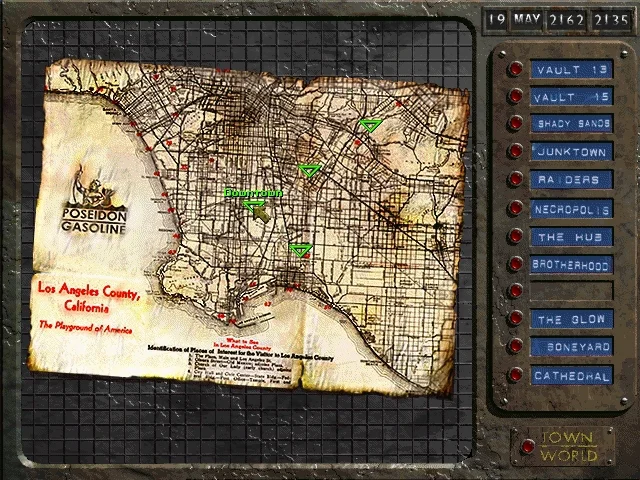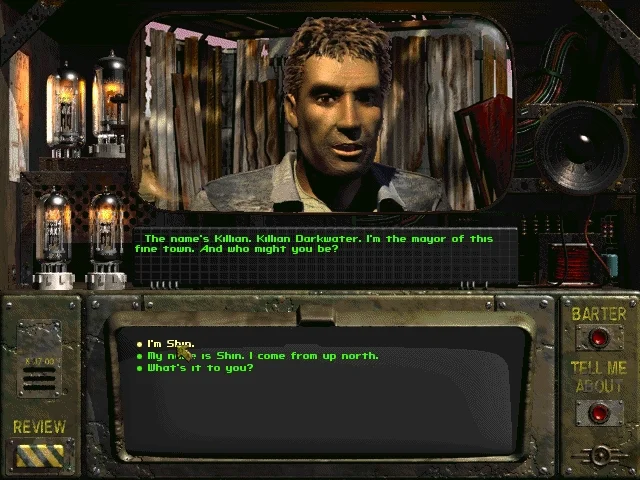CRPGs were going through a difficult time in 1997.
Once the darling of PC video game enthusiasts, computer roleplaying games were approaching the status of a dead genre by the mid-90s. The popularity of the Ultima series had fizzled out, and stunning JRPGs like Final Fantasy VII on consoles and first-person blockbusters like Quake on PC were reigning supreme. But thankfully, that state of affairs perfectly set the stage for an unexpected comeback story. 1997’s Fallout was a game that no one saw coming, not even its publisher. Its modest sales success spurred new interest in the genre, leading to a golden age of isometric CPRGs between 1997 and the beginning of the 21st century.
One hundred years after a worldwide nuclear war, you’re a resident of Vault 13, an underground fallout shelter that protected your descendants from the atomic destruction above. But now, its water purification chip has failed after a century of constant wear and tear, leaving only 150 days of drinkable water. Your task is to leave the Vault for the first time in your life to find a replacement for the water chip. On your journey, you will discover the ragtag, savage civilization that has sprung from the ashes of destruction, struggling to survive in a post-apocalyptic wasteland. And in your quest to save your Vault, your choices will impact every corner of this new world, determining who will live, thrive, struggle, and perish.

Fallout was the forerunner in a popular resurgence of CRPGs of the late 90s published by Black Isle Studios, including Bioware’s Baldur’s Gate and Baldur’s Gate 2 and Black Isle’s own Planescape: Torment and Icewind Dale. It takes an extraordinary game to repopularize a thought-dead genre, and Fallout certainly fits the bill. If you’ve only ever played the Bethedsa-era entries starting with Fallout 3, you’re going to be in for an adjustment when you step into the California wasteland. While you will find some comforting aspects from the series, such as Vault Suits, the Brotherhood of Steel, and Power Armor, other parts, such as the extended Vault-Tec lore, 50s aesthetic, and iconic sense of humor, are yet in their infancy.
Fallout opens with character creation, leaving fans of future titles feeling reassured that they are playing a Fallout game. First, you select your stats in the SPECIAL system, also picking three skills and two traits that determine the shape of your playthrough. You also get offers of potential perks every few levels to further customize your character and playstyle. If you want to play a happy-go-lucky charmer who talks their way through every confrontation, put your points in Luck and Speech skills. If you want a super-strong bruiser with the IQ of a mole rat, put your points into Strength, the Big Guns skills, and leave your Intelligence as a dump stat. There are so many different ways to play Fallout, and all of them are right!
Rather than the first-person shooter RPG that it evolved into with Bethesda, Fallout offers an isometric POV that became the standard for most CRPGs of its day. Even though character sprites were highly detailed, the graphics aren’t what anyone would call eye-catching, even by the standards of the mid-90s. Compared to the N64, PSX, or other contemporary PC games, Fallout looked retro at best and dated at worst. Despite this, I found the graphics charming, with imaginative character and monster designs. Environments are a little flat (literally, as the vast majority of buildings are a single level), which, unfortunately, limited the environmental storytelling the series would become known for. But really, if you’re judging the game based on how it looks, you’re missing the point. The graphics here are the kind of thing that you need to accept and move on.
The most important piece of advice I could give to potential Fallout players is to read the brilliantly imaginative manual cover to cover. This Vault Dweller’s Survival Guide will not only clue you into the lore and backstory of post-apocalyptic America but also teach you how to actually play the game because, unlike today’s RPGs, you aren’t going to find anything close to a tutorial. Much like your Vault-Dweller, the game dumps you into an unfriendly world with a gun and says, “Figure it out.” At first, the interface can be cluttered, confusing, and decidedly not user-friendly. I found that learning to navigate the menus effectively was my biggest challenge. Inventory management can be especially infuriating, clunky, and unintuitive. That said, it isn’t like Bethesda entries improved much on this, as Pipboy inventory management is still pretty terrible, even today.
Combat in Fallout is a relatively basic turn-based affair. Every round, you have a limited number of points to spend on attacks, movements, and actions. Firing your gun can take anywhere from four to six points. Aiming at specific body parts (a mechanic that will become known as the VATS system in future games) takes even more points. If you want to maneuver your character around the map, each step will be a single point (and believe me, movement will be important if you want to avoid friendly fire from your companions, as many old Fallout memes celebrate). After your turn, your enemies and companions take their actions while you stand observing the unfolding situation. Repeat until all enemies are dead or you are.
Of course, you aren’t limited to firing your gun every turn. You can use stimpaks to heal yourself, toss off a grenade, or take some drugs to buff your stats (be careful not to become addicted). This system lacks some of the more interesting combat options of other CRPGs, like magic or character-specific abilities, but the limited selection of combat actions works very well in context. As Fallout is a classic CRPG, your success on and off the battlefield depends on RNG and rolls. The higher your stats in a specific area, the better the odds that you succeed in your actions.
This system lends itself to a remarkable amount of flexibility regarding choices you grapple with in the Wasteland. Your actions and decisions have real consequences on the world. Take too long to find a water chip, and you find everyone in your Vault dead. Don’t stop the Super Mutants soon enough, and they start invading and eliminating settlements like the Ghoul-inhabited Necropolis. Just accept that your first run won’t be perfect and you will miss a ton of content. Seeing everything that the game has to offer is what repeated playthroughs are for! There also isn’t a fully formed karma system here yet, but there are faction reputations and choices that you could categorize anywhere between goodhearted and insanely evil that will shape how the denizens of the Wasteland react to you.
Though future entries are known for their expansive soundtracks featuring vintage music, Fallout only features a single period-specific song: Maybe by the Ink Spots. Turns out that this iconic tune was all that was necessary to set the mood for the entire game, and arguably, the entire series. The background music tends to be unobtrusive, offering more of an appropriate ambient soundtrack than memorable melodies. Voice acting is limited mainly to primary quest-givers and important NPCs. Thankfully, these character moments are voiced by an incredible cast of legendary voice actors, including Keith David, Tony Joy, Tress MacNeille, and the voice of Fallout himself, Ron Perlman.
Mind you, I do wish they spent a few members of that incredible voice cast on the companions. In Fallout, companions are barely even sketches of characters with minimal, if any, backstory. They are helpful as meat shields and pack mules and not much else. On top of that, their battle AI is also thicker than the dumbest Super Mutant in the Wasteland. The most famous example is the eagerness of your companion, Ian, to blow you to shreds with a burst from his SMG if you get between him and an enemy. Another issue with companions is the lack of customization. Getting them to upgrade their weapons or armor is an incredible chore requiring you to go through multiple conversation trees. Companions also become increasingly useless as you approach the endgame, as they can be instakilled by a single Super Mutant wielding a minigun or rocket launcher. I recommend leaving them behind before storming the final dungeons, unless you want the karmic payoff of watching machine gun fire tear Ian apart. I sympathize with you if you do.
When I think of modern-day Fallout, I think of modding. Fallout and Fallout 2 lack the robust modding scene of future titles. However, there are still many ways to customize your experience. Fallout Fixt, an unofficial restoration patch, not only fixes 30-year-old game-breaking bugs but also removes controversial censorship included after release, such as the removal of child NPCs. I am not a virtual child killer, but I do think that it should be an option (Now THERE is a line that could be taken out of context). The Fixt patch also offers a range of non-canon mods that can greatly enhance your experience by modifying features, restoring cut content, and rebalancing the overall difficulty. I played without any of these enhancements, as I wanted as “pure” a run-through as possible, but if you’re looking to play Fallout for the first time, I would highly suggest exploring some of these options.
Fallout is many things: a brilliant CRPG at times, a disjointed mess at others, and a foundation of great things to come. But is it any fun to play? Absolutely. I primarily played Fallout because I was curious about where one of my favorite series started, but I walked away with a great appreciation for it as a standalone experience. Yes, there are a lot of gameplay quirks of the time that haven’t aged well, but the core of the game is unbelievably solid. Pushing past the initial struggle with the dated interface and clunky gameplay can be challenging, but it’s well worth the effort. Fallout turned out to be one atom-bomb baby that was exactly like I wanted her to be, a million times hotter than TNT!




